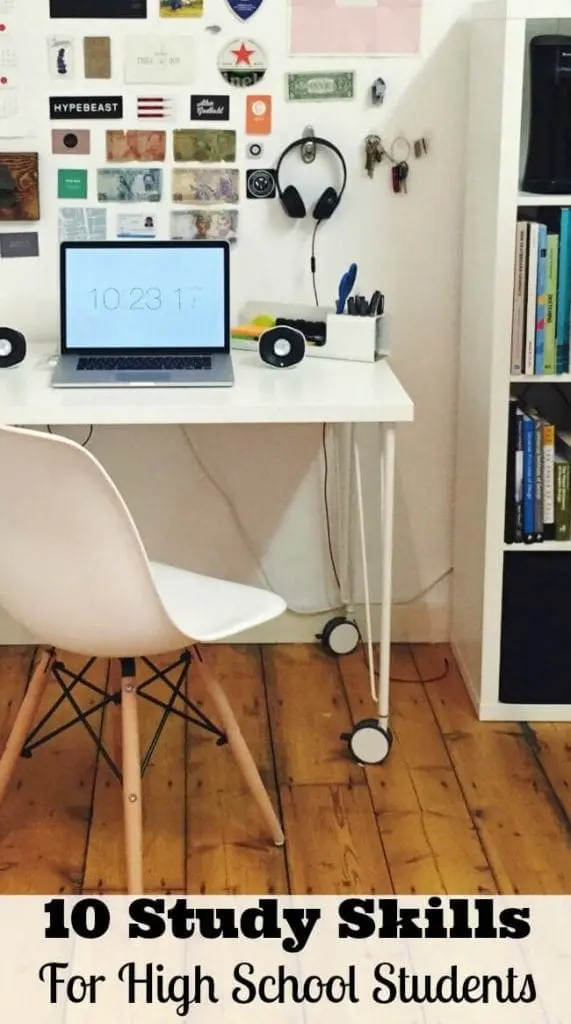Developing strong study skills as a high school student not only allows you to earn better grades in high school, but also to prepare yourself for college. That’s why it’s important to build a strong study habit early. The sooner your kids start to build their study skills, the more good habits they’ll create that will make school much easier for them down the road. Sometimes, they can coast through elementary school and middle school without putting forth much effort but usually high school provides enough challenge that they will need to develop strong study skills to help them succeed. Here are 10 study skills high school students should know. I also provide 10 tips to beat distraction while studying.
Take Time To Develop Essential High School Study Skills

The biggest mistake most students make is waiting until the night before the exam to start studying. As Richard Evans, education expert and founder of The Profs, says, “Students use cramming to absorb as much data as possible in one go. It might help them to pass the next day’s exam, but long-term memory retrieval cannot be tricked with one revision session. Effective information processing happens when learning develops in phases. The brain needs time to familiarise with the new information, process it and strengthen the synapses that preserves it. Without learning intervals, there is no long-term information retention. So, if you want to improve your memory, plan a study schedule in a time frame and stick with it.”
My freshman has excellent study skills and I don’t have to worry about her knowing what to do or how to do it because we have worked on her study skills all along and she knows when to come to us for help.
10 Study Skills For High School
These study skills will set your high school student up for success in all fields wether it be performing well on homework assignments, classroom quizzes and tests, and standardized testing.
1. Boost Brain Power
It’s hard to focus when you’re tired and hungry. Making sure your teens are eating healthy and getting plenty of rest will help them be more focused and productive the next day. It will also help to give them the motivation they need to complete tasks they may think they aren’t capable of. Have healthy, brain-fueling food available to them for both for grab-and-go snacks and meals. Adequate rest is a foundation for all the other study skills and it help them to be more effective.
2. Develop Concentration
Learning how to focus on the job-at-hand instead of being distracted by phone calls and social media is a skill your kids will need long after they finish school. Help them set focused study time for nothing but school work. Create a quiet study zone that includes a phone-free environment for studying.
I told my son he could listen to music while he studied and he figured that meant it was fine to put on music videos. This did not have quite the same effect as he was very distracted and unproductive. Sometimes it is good to check in and see what their study habits really look like. That way you can help them find a better way or tell them what a good job they are doing and how it makes you proud to see them giving their best effort. It’s also important to encourage short study breaks about every 60 minutes or so to give their brain a chance to rest from the focus and prepare for the next task.
3. Organizational Skills
Being organized will help your teen be successful. If they know where to find their study materials, when their assignments are due, and what’s expected of them in their classes, they’ll be better prepared for success. Help your child find a convenient location for putting all their school supplies, books, and homework assignments when they get home.
Teach them to use their calendar agenda to make notes of when projects are due, tests are coming up, and other assignments need to be completed. Then help them create a plan to get everything done on time instead of at the last minute. Show them how to break down their projects into smaller tasks and schedule time to work on each of them. Using their agenda is one of the best organizational skills. However, it is important they know how to keep their binders organized as well. They use dividers to find their notes, homework, tests, and handouts easily.

4. Time Management Skills
Students usually have a more difficult time managing their time in high school than college. Most high school students average about 35 hours a week of class time while college student only get about 15-18 hours. Learning how to manage their time when they have less free time will help them be more productive with their free time when they get to college.
You want to give them time management study skills but also let them be responsible for their own time management. First teach them the skills and then check in a few times to make sure they understand how to do it themselves. They may not do a good job right away but sometimes that is how they learn to do it for themselves.
My son is just learning time management so I have been checking in with him on and making sure he has a list for the day. Then I let him organize his time the way he wants. He doesn’t always get it all done. However, he is learning to start things earlier than he thinks and get the most important things done first. It is better he fail now than later. I know a young college student that said he dropped out because there was no one to make him stop playing video games and go to classes. Self reliance is an important part of time management!
Keeping a day planner, a to-do list, or using an online calendar app will help them make the most of their time. They can block off school hours, study hours, extracurricular activities, and family/friend time. Whatever’s left, which isn’t much, is theirs to do with what they want.
5. Active Reading Strategies
Reading is one of the important study skills high school students need to have. However, reading doesn’t work if you don’t focus. Active reading strategies help you not only pay attention but find the main ideas and analyze. It is great if books can be highlighted as they are read and notations made in the margins. If books are rented, high school kids can take notes and write down vocabulary words and important topics with page numbers as they read.
6. Note Taking Skills
A big part of study skills for high school students will involve them reviewing the notes they took in class. Therefore they will need to learn active listening strategies and presentation skills. These will help them to be able to take high quality notes. Note-taking short cuts will help them keep up with the teachers. They do not need to write down everything said, just the important things. They may have to jot down keywords, dates, names. Then, fill in the details later if they are having trouble getting down enough. Learning to organize and denote things in a clear visual way may include using bullet points and diagrams. This is also very helpful in taking good notes.
7. Use Flash Cards And Other Study Tools
Use flash cards to help organize information and quiz yourself on things that require rote recall. Say answers out loud and quiz yourself in both directions so that partial information will trigger the recall. Other study tools that may be useful are creating graphs or timelines of the information you need to know. Visual tricks and Mnemonic Devices are all useful ways to retain information more effectively. Placing post-it on important areas to review or using colored pencils to group topics can be useful tools as well.
8. Research Skills
Students need to know how to look into topics further. Whether they need to clarify something from their class notes or write a paper, basic research skills are necessary.They need to learn where to look for information, how to evaluate sources, and how to credit sources. Integral to teaching them research skills is also having a conversation around plagiarism. Make sure they understand how to properly quote things and properly cite their sources.
9. The Ability To Prioritize
When studying, it is also important that students understand what topics may be more weighted on the test. If certain areas of the test will be scored more heavily, they may wish to spend more time studying those areas and answering those questions. If questions on the test are all going to be scored equally, they need to be careful not to get too bogged down by the hard questions. Skip those and return to them if time permits. Students need to become adept at determining what will be most important for the class. Looking a the syllabus is helpful to determine what elements are taken into account for the overall grade and what percentage of the grade they make up. Asking the teacher questions about what areas deserve extra priority when studying may also be useful.

10. Getting Help
Knowing when to seek help and what type is an important skill. If it is the night before the assignment is due and the high school student needs help, they need to know different options. They should learn how to search the internet for answer, ask parents for explanations, or contact classmates for clarification. Study groups can be useful if your child is good at staying on task.
If they are having trouble before or after a test, they should always seek to meet with the teacher for a help session. This will show the teacher you care. The teacher is best suited to knowing what sort of help you need and what extra practice will be most useful. If the student is putting forth their best effort and has reached out to the teacher for help without success, they may need a tutor. This extra help can help get past a particularly difficult subject. Knowing that asking for help is not a sign of weakness but rather sign of determination to grow and improve will go along way to allowing your child to achieve his or her potential.
Tips To Beat Distraction While Studying
Beating distractions while studying can be challenging, but with the right strategies, you can improve focus and productivity. Here are some tips:
- Create a Study Schedule: Set specific times for studying and stick to them. This helps your brain get into a routine and reduces procrastination.
- Designate a Study Space: Find a quiet, comfortable place that’s free from distractions like TV or noisy areas. Keep your study area organized to minimize visual clutter.
- Use the Pomodoro Technique: Study for 25 minutes, then take a 5-minute break. After four sessions, take a longer break. This method helps maintain focus and prevents burnout.
- Limit Digital Distractions: Turn off notifications on your phone or use apps that block distracting websites. Consider putting your phone on “Do Not Disturb” mode or keeping it in another room.
- Set Clear Goals: Break down your study tasks into manageable chunks and set specific goals for each session. This makes it easier to stay on track and feel accomplished.
- Practice Mindfulness: If you find your mind wandering, take a few deep breaths and gently bring your focus back to your work. Mindfulness exercises can help improve concentration over time.
Conclusion
Strong study skills for students will help them to develop great habits that will make them successful in high school, the college process, and in their career later in life! Does your high school student need help developing strong study skills? Be patient as you teach these skills and check for understanding and implementation. Like most things they take practice but they are worth it! Which study skills does your high school student find most challenging? Did they find the tips to beat distraction while studying helpful?
Related Posts:
Photomath Math Solver App- Helps Students With Homework

Div says
From my own personal experiences as a student and as the mother of two elementary school students, I believe in study skills. I also believe that study skills are something we develop with a little guidance and that these skills go along way towards creating better students that are more successful at reaching their goals. Since Kindergarten, I have been working with my children to help build strong study skills.